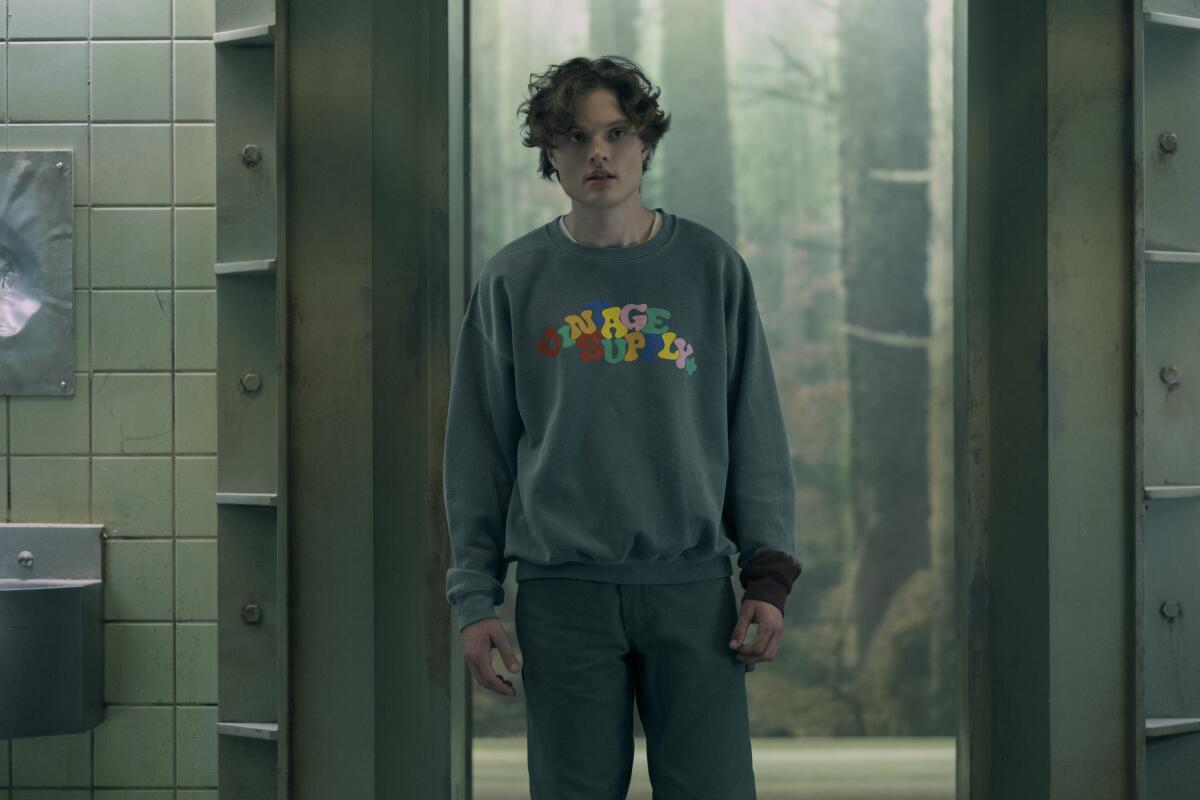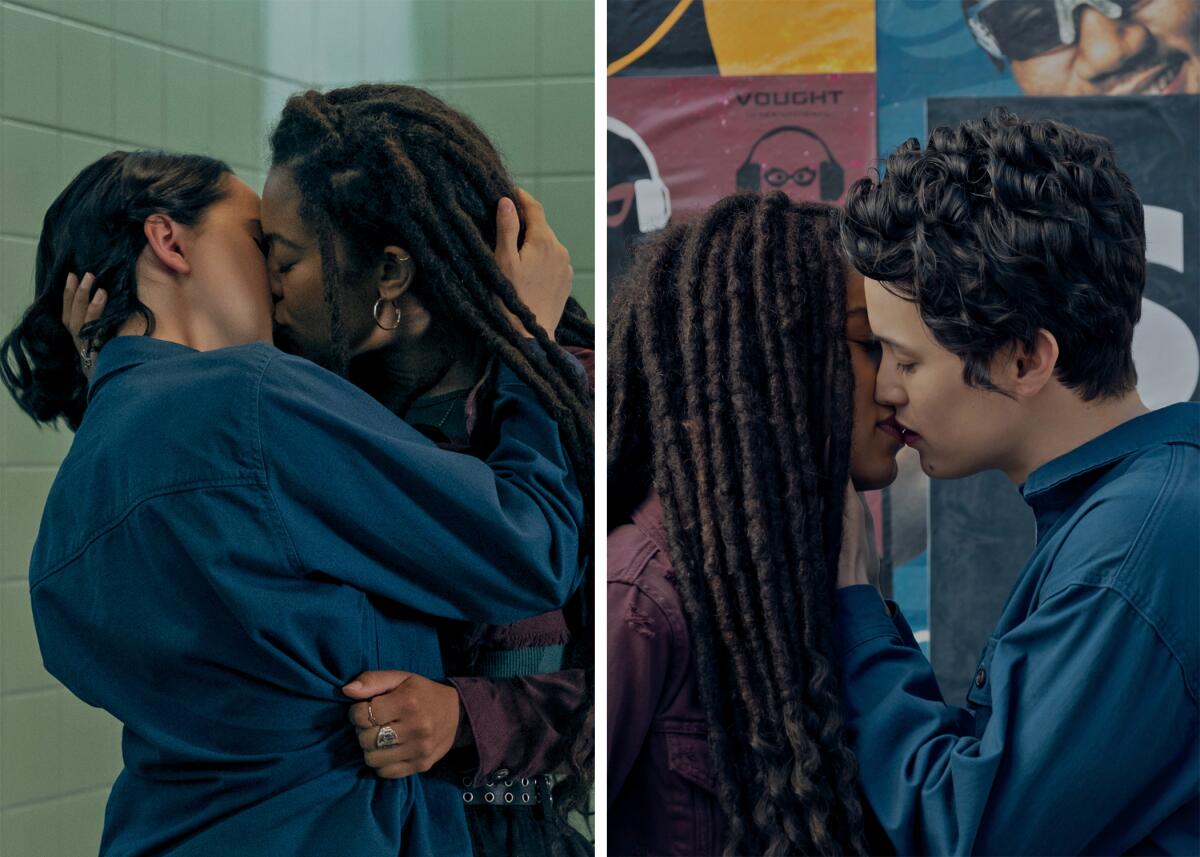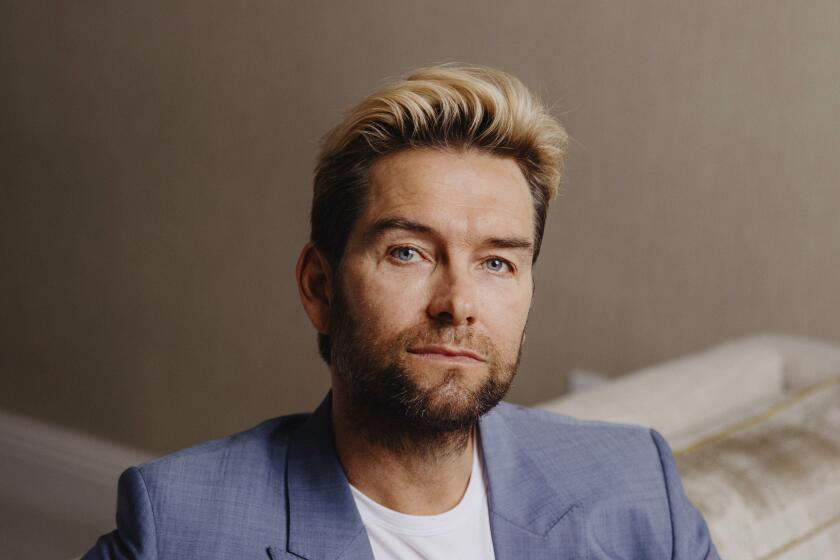‘Gen V’ creators discuss the funny, scary finale from the little sibling of ‘The Boys’

- Share via
This article contains spoilers for the Season 1 finale of “Gen V.”
As “Gen V” careens toward its scary, funny and crazy first-season finale (having just been greenlit for Season 2), let’s pause this explosion and remember what we’re all here for: an explanation for what’s happened and what’s next for “The Boys’” little sibling.
Over seven episodes of the Prime Video series that’s produced by Sony Pictures Television, the gifted youngsters at the Godolkin University School of Crimefighting have learned significantly more important lessons in their extracurricular activities than in their classes — particularly that there’s a mysterious lab called the Woods, run by corrupt conglomerate Vought, hidden on campus and young “supes” like them are being kept prisoner there as subjects of experiments. One of the captives, Sam (Asa Germann), the supposedly dead brother of their actually dead comrade Luke (or Golden Boy, the erstwhile BMOC played by Patrick Schwarzenegger), may be the most powerful of them all. Which is pretty bad news for fans of sane super people, because while Sam seems nice enough, he’s also deeply traumatized, delusional and apparently easily triggered into homicidal rages.
As the end-of-season apocalypse hits, Michele Fazekas, “Gen V” showrunner, and Eric Kripke, master of the universe (“The Boys” universe, anyway), joined The Times to talk about the series and explain the whys and hows of the first season. This interview has been condensed and edited for clarity.
If “The Boys” is an evil-funhouse version of the Justice League, “Gen V” is an evil-funhouse version of the X-Men, with teens finding their way through their powers at a school for superheroes. But because it’s in the “Boys” universe, they’re being manipulated for profit or other nefarious ends. How does that description fit and not fit?
Eric Kripke: There’s definitely [X-Men] DNA because the storyline in the ‘Boys’ comic that loosely inspired it is about this Godolkin school. It’s this English manor where they study and they’re these heroes called the G-Men that are clearly meant as Garth Ennis’ parody of the X-Men. As dark as our show is, that storyline is way darker.
Michele Fazekas: This was a lab before it was a school. Vought was like, “We created monsters who could probably kill us. So how do we control the monsters?” There’s so many things going on at this school that these kids don’t even know about and we’re putting this pressure on them: “Make a choice. What are you going to be?” And it is a metaphor for where we are now in life. You’ve got all of this political and social pressure: “Am I going to go with the group because it’s easy or am I going to find strength in myself?”
Kripke: We’re trying to make it reflect what’s going on right now, up to the minute, for a comic that was written almost 20 years ago. As Michele has said, another element that reflects what’s going on today is influencer culture and social media culture. There’s never been such a crowd of kids dying to jump into the meat grinder of capitalism, shoving each other out of the way to sell how we don’t look.
Fazekas: But also, Eric, you’ve talked about this too: The thing that is missing from the X-Men, and I love the X-Men, is you have all of these adolescent kids in school; they’re not f—ing all the time and doing all the drugs? That’s what “The Boys” does so well: “Let’s put it in the actual real world.”

That comparison also has deeper roots in that the original X-Men actually was about things — there was a civil rights metaphor embedded in it. “Gen V” is very current about the issues the kids face. You’ve got date rape on campus, eating disorders and gender identity questions. Were those issues all baked in when you started?
Fazekas: When I started on the show, the characters already existed in some form. I came in like, “Jordan‘s your secret weapon here.” [The character, played by London Thor and Derek Luh, is able to switch genders.] I’ve never seen a character like that. It’s a great way to get at trans issues. It’s not just to be outrageous. You have real underpinnings and real stakes. We’ve had subject-matter experts come in and talk about eating disorders and cutting. We hired a trans writer and he’s great because he doesn’t tell us, “You can’t do this.” It’s more, “This line might be a little offensive or is sort of a stereotype, but you could say it this way.”
As Eric always says, the powers are a metaphor for psychological goings on, especially at this age. I also love that they have a toll. Marie (Jaz Sinclair) is hurting herself and Emma (Lizze Broadway) is hurting herself [to use their powers]. And you’ve seen in episodes 7 and 8, Andre‘s (Chance Perdomo) power has a cost. Andre’s is becoming like a CTE story.
Kripke: We intentionally run headlong into the complicated, hot-button issues. As Michele has said, that’s the power of genre, that you can get away with that, that Amazon can put on an anti-corporate franchise. And we can talk about eating disorders and sexual predation and gender identity in a superhero show. You’re talking about what really matters to people. And I think audiences connect to that. So it’s a blast. We’ll never have a job like this again.
Look! Up in the sky! It’s a bunch of quality shows with superheroes in them!
The finale feels like a horror movie at times before it turns into this giant free-for-all (and some hilarious things happen as well) with political conflicts out in the open. Were those tonal shifts discussed?
Fazekas: The horror movie, which was intentional, came in the editing process. We searched through footage to find those creepy, slow-moving shots of empty hallways. We even leaned more into it as we were editing because, in part, it’s a metaphor for a school shooting.
Kripke: Even though “Gen V” has a more intimate focus, it is politically minded and political rallies on campus are a classic college trope, just like hangovers and classes and going out. The school is a hotbed of dissent between Starlighters [fans of “Boys” heroine Starlight] and Home-Teamers [followers of uber-villain Homelander] — the Home-Teamers believe superheroes should be able to do whatever they want, and Starlighters feel like there need to be controls in place.
Homelander of “The Boys,” has the charm of a politician, the power of a god and the maturity of a tantrum-throwing child. The actor who plays him talks about what makes him lethal and memorable.
And I will say, without spoiling anything, part of the odd job of these [two] shows is they have to completely stand alone and then as they ramp up, hand the football to the other show. This presidential election that’s occurring in the background, this virus and Victoria Newman (Claudia Doumit), this rising belief in supe supremacy and the fact that society is rending itself apart — all of those are important atmospheric background issues for “The Boys’” Season 4 playing field. Each show can kind of Trojan Horse a little bit of what’s going on in the other show.
Fazekas: The virus storyline did not exist when I started. We knew that [dean Indira] Shetty (Shelley Conn) was going to be a bad guy. We knew that Shetty was involved in the Woods. We didn’t really know what the Woods did, we just knew that it was some secret lab. As we started talking about the back half of the season and knowing what we had to set certain things up for “The Boys,” that’s where the virus storyline became organically great, because it’s like, “Shetty wants genocide; Shetty wants to kill all superheroes.” The other side of that is supe supremacy. So it organically came together as, “Let’s see this divide on campus [and among] our characters.” It’s a good example of how we can talk to “The Boys” but don’t feel like we’re hemmed in. There’s a lot of room to be creative.
We’re also sort of operating in real time here. So we end Season 1 of Gen V and then a whole season of “The Boys” happens. Season 2 of “Gen V” happens after that.
The show has been well-received critically (97% positive on Rotten Tomatoes) — are you aware of fan responses?
Fazekas: You’re not supposed to read comments, but sometimes I do. People were very concerned: “Oh, this is just going to be a woke version of ‘The Boys.’” And it’s like, I mean, whatever. But I’m really happy that people seem to be loving these characters, understanding that it’s still satire, it’s still funny. People seem to really like Jordan. I credit that to both the character and the actors playing that character.
Kripke: Well, I read comments for hours, for hours. It’s so bad. I know. It’s just this masochistic thing that I do. But “Gen V” has been a uniquely joyous experience because the response is overwhelmingly positive. The fact that people seem to be responding to it and they seem to really be picking up on the nuances of Marie and Emma and Jordan and Sam and are digging the twists and loving connecting to the characters is honestly a huge relief. But my favorite comments to read are, “I was surprised by this. I was expecting some teen drama. And it is, but it’s also this amazing tone and great characters.” As a filmmaker, I’ll take pleasantly surprised any day of the week.
Eric, do you have anything you want to tell readers about Season 4 of “The Boys”?
Kripke: Buckle up.
More to Read
The complete guide to home viewing
Get Screen Gab for everything about the TV shows and streaming movies everyone’s talking about.
You may occasionally receive promotional content from the Los Angeles Times.








